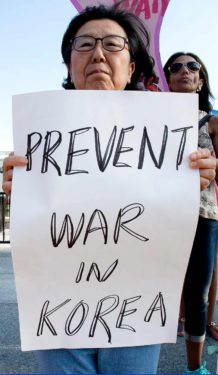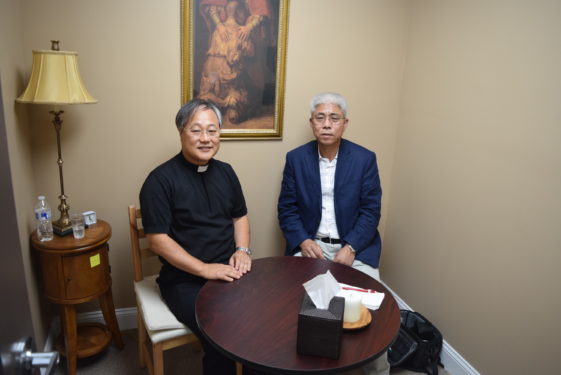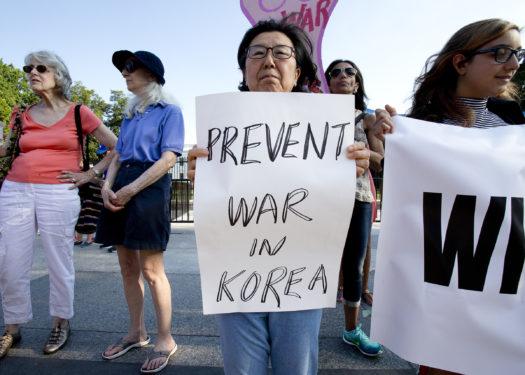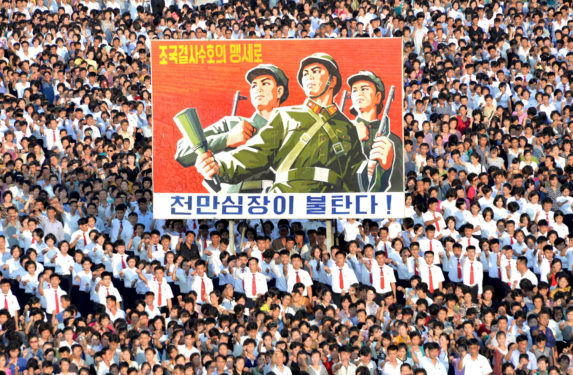A local Korean pastor is concerned about how decisions made by President Donald Trump and North Korean dictator Kim Jong-un will affect his life in Queens.
Father Andrew Kim, pastor of St. Paul Chong Hasang, Flushing, says his parishioners are closely following events in Korea because so many still have family back in their homeland.

“Kim Jong-un has his own interests, President Trump has his own interests, and even China has its own interests,” says Father Kim. “They are playing each other but we as the people are the casualties of the whole thing. The worries for Korean immigrants here in the United States are that they feel threatened by the immigration issues.
“Trump’s whole line of ‘Make America Great’ again worries the people and makes them question their identity in American culture. These people want to be Americans and want America to be great and to be their home, but that can be a struggle.”
Father Kim was born in Cheongju, South Korea, and came to the United States in 1986 to attend Queens College to study accounting. He worked for two years in an accounting office before entering Immaculate Conception Seminary, Huntington. He was ordained in 1998.
“The spiritual strength here at St. Paul’s Church in general allows people to gather and share their struggles but also their success,” he explains.
“These people work so hard to provide a new life for their children and the second generation and so on are the ones that provide new hope as they go on to make something of their own lives.
“We see the church as a safe zone for both immigrants and American-born people where they can all be together and pray for peace.”
Parishioner Mike Choo, grew up in Busan, South Korea, before arriving in the United States in 1987 and starting his family here in Flushing.
He explained that his son and daughter are always his number one concern.
“I want peace. I came to the United States to find peace for both my family and myself,” he said.
“My children have a different opinion and don’t know as much of the Korean side because they are born here and are exposed to the American media much more. In Korea, I still have many relatives and friends that I worry about and miss. I do worry about Trump and Kim Jong-un but I don’t think there will be war. I think there will be peace and I pray for peace.”
Diplomacy and political engagement are necessary to resolve the differences and avoid a military conflict, says the chairman of a U.S. Catholic Bishops committee, in a letter to Secretary of State Rex Tillerson.
Bishop Oscar Cantu of Las Cruces, New Mexico, chairman of the bishops’ Committee on International Justice and Peace, echoed a recent call from the Korean bishops’ conference to support talks to secure the peaceful future of the Korean Peninsula.
Bishop Cantu acknowledged that the escalating threat of violence from North Korea’s leaders cannot be “underestimated or ignored,” but that the “high certainty of catastrophic death and destruction from any military action must prompt the United States to work with others in the international community for a diplomatic and political solution based on dialogue.”
The letter follows days of back-and-forth threats between President Trump and Kim Jong-un. Trump has threatened to unleash “fire and fury like the world has never seen” in response to Kim’s warnings of imminent attacks on the U.S. Meanwhile, Kim has said his country was preparing to fire missiles into waters around Guam, a U.S. territory in the western Pacific Ocean with two military bases.
The Catholic Church on Guam is urging its members and all people on the island to be prayerful and stay centered in Christ amid threats of missile attacks.
Coadjutor Archbishop Michael J. Byrnes of Agana, Guam, asked all priests to promote prayers of peace at all Masses as tensions continue.
“In your Masses this Sunday, especially in the prayer of the faithful, please offer prayers for peace between our nations, just resolution of differences, and prudence in both speech and action,” Archbishop Byrnes said in a message to all priests of the Archdiocese of Agana.
“Please also offer prayers for the men and women of our military, especially those whom we host on Guam, that they might find grace for diligence and courage as they execute their respective duties,” he said.
George A. Lopez, chair emeritus of peace studies at the University of Notre Dame, South Bend, Ind., told Catholic News Service, the interests of both countries can be addressed at the negotiating table.
“We need somebody to talk about what are the underlying security needs of both North Korea and the United States and is there a forum to talk about that,” Lopez said. “If the U.S. issued a simple pledge that we seek no first use against North Koreans, we seek some way to bargain this out, you’d get some response to that.”
Asian nations want stability rather than uncertainty and that will require that talks get underway to assure the peaceful co-existence of both countries, Lopez said. “So how do we get there?” he asked.
Contributing to this article were Matthew O’Connor of The Tablet and Dennis Sadowski of Catholic News Service.



